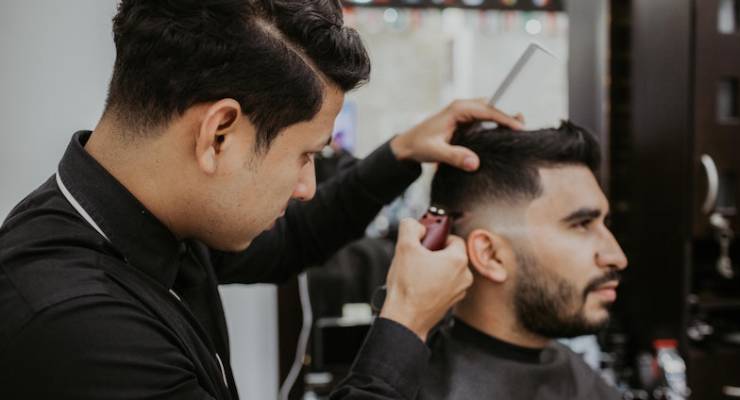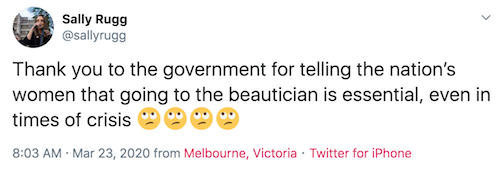
When Prime Minister Scott Morrison finally announced a shut down of all non-essential services late Sunday night, following similar calls from NSW and Victoria, confusion still lingered over what would remain open.
While bars, restaurants, and religious institutions shut down, hairdressers and beauty salons were deemed essential services, and allowed to continue trading. That decision seems in tension with measures designed to enforce social distancing — such services involve spending considerable time in close proximity to other people, with physical contact.
There seem to be a few reasons floating around as to why such services are still operating.
Sandy Chong, CEO of the Australian Hairdressing Council told Crikey the industry was likely exempt because, unlike at a pub or gym, owners could better control the spread of people and maintain social distancing.
“My understanding is when the government made the decision to close down particular businesses, it was because they are areas where they cannot control crowds and groups of people,” Chong said.
“A hairdressing salon has appointments and we can control how many people come in.”
However, Chong said there were mixed views in the industry about whether the decision to keep salons open was the right one.
“Not all of us can comply with 1.5 metre distance rules … There are some businesses that are taking their obligations seriously and some that are not.”
But others are less clear as to why these services are exempt. Speaking to news.com.au, the Hair and Beauty Industry Association’s Mark Rippon said he wasn’t sure why salons were able to stay open.
Meanwhile, according to the Daily Telegraph, the decision was based on experiences during the 1990 recession, when people still wanted to look and feel good in spite of economic hardship.

When Crikey asked the Health Department about the classification of hair and beauty as essential services, we were initially referred to the Department of Industry, Innovation and Science. Industry then referred Crikey back to a transcript of Morrison’s press conference on Sunday night.
A spokesperson from the Department of Health later told Crikey that states and territories were responsible for determining what is an essential business and may be exempt from current restrictions.
The government’s decision might also be based on similar calls made overseas. In the United Kingdom, Boris Johnson also deemed such services to be essential and allowed to remain open. But the decision garnered fierce criticism, including from Tory MP David Morris, who owns six hair salons.
That inconsistency also didn’t last long. This morning, Johnson made the decision to put the country into almost complete lockdown.
Chong, meanwhile, believes it won’t be long before we move into the next stage of the lockdown, and hairdressers too will have to close their doors.








The sign on a local locked 24/7 gym notes that gyms are an essential service.
I did my first long bike ride this morning, to replace my daily exercise fix in the gym. I did 48 km in… actually I rather not say, being embarrassed by being passed by a granny on a 3-speed bike…
I normally take the dog to a local vet monthly for a bath. The vet phoned me yesterday to tell me that next Saturday’s appointment is cancelled, despite my noting that it’s essential service, particularly if she rolls in something disgusting at the park, and I was planning on dropping her off, going away, and coming back later.
Dogs can get COVID-19, but they can’t pass it on (just as well, they don’t understand 1.5 metres).
… “Go-go gadget arms”?
…. Is it a fringe economy?
I can’t think why Scotty (from Marketing), Fraudenberg and Sturmbahnfurer Von Ditton would have any objection to closing hairdressers. Michelia would be a mess tho.
Well I’d say that Von Ditton wouldn’t be fussed, he only needs to run a shaver across his scalp and it’s fait accompli.
Now that the Government has found the courage to impose draconian rules to safeguard against the spread of Coronavirus can they bring in rules to ban the ubiquitous facial hair that seems to have spread like a disease in Aussie males. I cannot see how the current proliferation can be helpful to facial hygiene.
I’ve had a beard for almost as long as I’ve had a face.
And human males have had them for 98% of the time our species has infected… sorry, infested… I mean, occupied the Earth.
I’m with you Agni.
Had mine since I was 21. Can’t understand why Nap has such a down on them. Perhaps down is the problem?
I had my hair cut, foolishly, two days ago, my barber attempted to shake my hand which I refused gently with a closed fist. I soon realised the absurdity of this gesture as he held my head to cut my hair. At no point while cutting was his face more than a metre from mine. He then proceeded to trim my beard rubbbing shaving cream around my nose and mouth. I paid with EFTPoS not cash and once the floor was swept he moved on to the next customer. At no point was hand sanitiser used the chair was not wiped down before use and of course there were no gloves or facemasks in evidence. Even with all these precautions no hairdressing is an intimate task and no barber could maintain s 1.5 metre distance from his client. I woke up with a mild sore throat and am now self isolating. I believe hairdressers should be shut down immediately like yesterday till we get this thing beat.
After that experience — and I wonder how many hairdressing salons are equally careless — I agree with you Simon.
Scotty or Gladys or both seem to think good looking beats dead looking